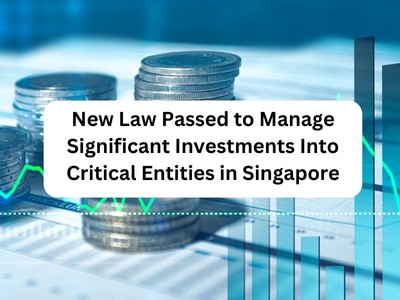Significant Investments to Singapore Deemed as Critical Entities Will Be Reviewed Under New Bill
 Singapore recently joined 37 other countries in reviewing its investments in the country to ensure it manages significant investments into critical entities. Major nations such as China and the UK have been reviewing investments in their country to ensure essential businesses can continue to serve the market even during challenging times. Recently, the Minister of Trade and Industry, Gan Kim Yong, tabled the Bill addressing the necessity of introducing such a new investment regime.
Singapore recently joined 37 other countries in reviewing its investments in the country to ensure it manages significant investments into critical entities. Major nations such as China and the UK have been reviewing investments in their country to ensure essential businesses can continue to serve the market even during challenging times. Recently, the Minister of Trade and Industry, Gan Kim Yong, tabled the Bill addressing the necessity of introducing such a new investment regime.
Protectionist policies have also increased due to geopolitical rivalries, and military conflicts have caused interruptions to vital resources like food and oil. Many nations have now begun to prioritise domestic and national security concerns, with a tendency.
Given this context, it is timely for Singapore to upgrade its investment management toolkit to guarantee its continued sufficiency and efficiency.
How The Law Works
The new law will review entities or businesses critical to Singapore’s sovereignty and security and currently not under any of the country’s legislation. The Singapore Government, specifically the Ministry of Trade and Industry, will consider whether an entity functions critically in Singapore’s national security interest. One deciding factor is if an entity is a crucial provider of security-related functions with the least likelihood of alternatives.
According to tabling the Bill, with a perspective of an uncertain economic environment, the Ministry will be enlisting specified entities as critical to national security in the Government Gazette when the law becomes effective. Sectoral regulations already protect most critical entities; hence, the likelihood of a long list is nonexistent. The new investment law will apply to a few entities. Once these entities no longer meet the criteria of being critical to the national interest, the government will remove them from the Gazette.
Complying With the Regulations
As part of the new law, entities listed as critical must comply with the respective rules and regulations:
- Seek approval for ownership or control changes from authorities. Without necessary approval, any transaction is considered void.
- Buyers are to notify the Ministry for Trade and Industry within seven days of holding 5 per cent of an entity. Further approval is necessary for other thresholds, namely, 12, 25 and 50 per cent, including acquisitions.
- Sellers must seek approval when they cease being the 50 or 75 per cent controller.
- Appointment of CEO and director posts requires authority approval. If they fail to comply, an appointment is considered null and void, and the authorities may instruct the positions to be made vacant.
- Entities cannot voluntarily wound up to ensure their reliability. The government can intervene if a national security issue or disruptions to the delivery of essentials occur.
Additionally, the new law gives the government the authority to review ownership or control transactions of any business, including the non-critical ones, provided it satisfies two conditions:
- First, an entity must have violated Singapore’s national security interests.
- Secondly, the ownership and control transaction must have occurred within the two years preceding the act against national security.
Affected entities can appeal to an independent reviewing panel to have decisions reconsidered. The Ministry of Trade and Industry will also establish an office as a dedicated one-stop shop for stakeholders.
Concerns of Future Investments
Due to the ambiguous nature of the criteria for enlisting investments into critical entities, Mr Gan assures that the government will review its list of authorised entities and conduct “assessments from time to time as required” but does not intend to increase the list in the foreseeable future considerably.
The Bill’s new measures are “largely similar” to those found in overseas investment regimes and align with international trade responsibilities. They are also “quite similar” to existing sectoral norms; hence, most investors will be familiar with them.
Sound & Secure Business Insights with 3E Accounting
Business continuity and resilience are imperative for the entity’s survival. If a business entity is even more crucial to the economic backbone of Singapore, it may further receive protection to ensure its resilience and relevancy to uncertain market conditions. Contact us if you are concerned about whether your business will be affected by the new Bill.








